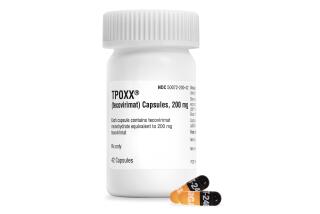FDA orders Cipro warning
- Share via
Drug safety officials Tuesday imposed the government’s most urgent safety warning on Cipro and similar antibiotics, citing evidence that they might lead to serious tendon ruptures that could leave patients incapacitated and needing extensive surgery.
The Food and Drug Administration ordered makers of fluoroquinolone drugs -- a potent class of antibacterials -- to add a prominent “black box” warning to their products and develop literature for patients emphasizing the risks.
Tendon ruptures are normally thought of as sports injuries, generally occurring among men in their mid-30s. The link to treatment with the antibiotics is highly unusual, and scientists still don’t fully understand why it happens.
However, FDA officials stressed that many of the serious injuries appear to be preventable if patients stop taking the drug at the first sign of pain or swelling in a tendon, call their doctor and switch to another antibiotic.
The two leading drugs covered by the warning are Cipro, made by Bayer, and Levaquin, which is made by Ortho-McNeil.
Cipro became a household name during the anthrax attacks of 2001. It is effective against that deadly bacteria, and is among the drugs stockpiled by the government in case of a bioterrorist attack. In everyday medicine, Cipro is often used to treat urinary tract infections.
Levaquin is generally used to treat respiratory infections. The FDA warnings do not apply to fluoroquinolone drops used to treat eye infections.
The FDA’s action came after consumer group Public Citizen petitioned -- and later sued -- the agency for such warnings.
Regulators took too long to act, complained Sidney Wolfe, head of the consumer group’s health section. Many injuries “would have been prevented if patients and doctors had known a pain in the tendon is an early sign that leads to rupture,” Wolfe said.
Public Citizen’s original petition was filed nearly two years ago.
FDA officials pointed out that prescribing literature for the drug class already carried clear warnings of the risk of tendon rupture. They said the agency acted to emphasize the warnings because continued reports of injuries indicated that the message might not have gotten through to doctors and patients.
FDA officials said they had received several hundred reports of tendon ruptures, but would not cite a specific number.
Wolfe, of Public Citizen, said the number was 407 at the end of 2007, with an additional 341 reports of tendinitis.
He continued to criticize the agency, saying it should also require drug makers to send individual letters to doctors about the risks.
FDA officials said manufacturers could choose to send such letters on their own.
Tendons are cords of tissue that join muscles and bones, and are essential in movement. The most common kind of rupture reported to the FDA involved the Achilles’ tendon in the heel, but some involved the rotator cuff in the shoulder, and tendons in the hands, biceps and thumbs.
Manufacturers called the tendon ruptures a rare side effect. They said they were complying with the FDA order and remained confident that the drugs’ benefits outweighed their risks.
More to Read
Sign up for Essential California
The most important California stories and recommendations in your inbox every morning.
You may occasionally receive promotional content from the Los Angeles Times.













